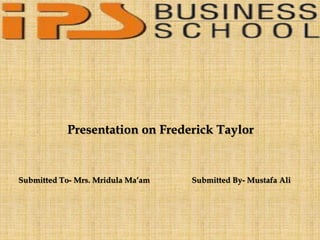
Frederick Taylor
- 1. Presentation on Frederick Taylor Submitted To- Mrs. Mridula Ma’am Submitted By- Mustafa Ali
- 2. TOPIC : MANAGEMENT THEORY BY F.W.TAYLOR CONTENTS: 1-TAYLOR’S CONTRIBUTION TO MANAGEMENT 2-WHAT IS SCIENTIFIC MANAGEMENT ? 3-MANAGEMENT THEORY BY TAYLOR. 4- MANAGEMNET VIEW. 5-PRINCIPLES OF SCIENTIFIC MANAGEMENT. 6-CRITICISM FOR TAYLOR’S MANAGEMENT. 7-HOW DO TODAY’S MANAGERS USE SCIENTIFIC MANAGEMENT??
- 3. Frederick Winslow Taylor (20 March 1856-21 March 1915), widely known as F. W. Taylor, was an American mechanical engineer who sought to improve industrial efficiency. He is regarded as the father of scientific management, and was one of the first management consultants. He is sometimes called as “Father of Scientific Management”.
- 4. It is the art of knowing what exactly you want from your men to do & then seeing that it is done in best possible manner. In simple words it is just an application of science to management.
- 5. Analyzing the work – One best way to do it. He is remembered for developing time and motion study. He would break a job into parts and measure each of 100th of a minute. The efforts of his disciples (most notably H.L.Gantt) made the industry to implement these ideas.
- 6. Taylor believed that the industrial management of his day was amateurish, that management could be formulated as an academic discipline. Best results would come from the partnership between trained and qualified management and a cooperative and innovative workforce. Each side needed the other and there is no need for trade unions.
- 7. Science not the rule of thumb: scientific investigation should be used for taking managerial decisions instead of basing on opinion, institution or thumb rule. Harmony not discard/ cooperation between employers and employees: Harmonious relationship between employees and employers. Cooperation of employees that managers can ensure that work is carried in accordance with standards.
- 8. Scientific selection training and development: selection means to choose the best employee according to the need. Their skill and experience must match the requirement of the job. Scientific development refers to criteria for promotions, transfers etc.. So that work is done with full efficiency.
- 9. Division of work/ responsibility: The responsibility of workers and management should be properly divided & communicated so that they can perform them in an effective way and should be reward for the same. Mental revolution: Acc. To Taylor, the workers and managers should have a complete new outlook; a mental revolution in respect to their mutual relations. Workers should be considered as a part of Organization. Employers shouldn’t treat workers as mere wage earners.
- 10. The four principles of management. 1. The development of a true science. 2. The scientific selection of the workman. 3. The scientific education and development of the workman. 4. Intimate and friendly cooperation between the management and the men.
- 11. Taylor created planning departments, staffed them with engineers, and gave them the responsibility to: 1. Develop scientific methods for doing work. 2. Establish goals for productivity. 3. Establish systems of rewards for meeting the goals. 4. Train the personnel in how to use the methods and thereby meet the goals.
- 12. The main argument against Taylor is this reductionist approach to work dehumanizes the worker. The allocation of work "specifying not only what is to be done but how it is to done and the exact time allowed for doing it" is seen as leaving no scope for the individual worker to excel or think. 1. The belief that increased output would lead to less workers. 2. Inefficiencies within the management control system such as poorly designed incentive schemes and hourly pay rates not linked to productivity. 3. Poor design of the performance of the work by rule- of-thumb.
- 13. 1. It was important because it could raise countries’ standard of living by making workers more productive and efficient. 2. Also it’s important to remember that many of the tools and techniques developed by the scientific management practitioners are still used in organizations today.